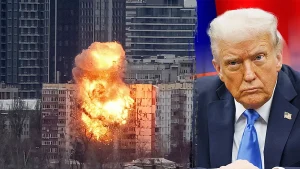The Christmas morning of 2023 brought a chilling awakening for the residents of Kharkiv, Ukraine’s second-largest city, as a barrage of Russian missiles shattered the festive tranquility. The attack, commencing before dawn, served as a stark reminder of the ongoing conflict that has gripped the nation for nearly a year. The city mayor, Igor Terekhov, issued an urgent warning via Telegram, alerting citizens to the imminent danger and imploring them to seek shelter. This latest assault on Kharkiv underscored the precarious security situation in Ukraine, even during a period traditionally associated with peace and goodwill.
The pre-dawn attack began with a piercing air raid siren at 5:41 a.m. local time, jolting residents from their sleep. The warnings, broadcast across the city, detailed the incoming threat: Caliber missiles launched from the Black Sea and Tu-95 strategic bombers maneuvering from the Volgograd region and the Caspian Sea. This multi-pronged attack, utilizing both sea and air-launched missiles, highlighted the calculated and coordinated nature of the Russian offensive. Ukrainian news station 24 Channel reported the use of ballistic missiles, adding another layer of complexity and danger to the already volatile situation. The sound of multiple explosions echoed across Kharkiv, each blast a stark testament to the ongoing conflict and the persistent threat to civilian life.
The immediate aftermath of the Christmas morning attack revealed the human cost of the ongoing conflict. At least one civilian, a 39-year-old individual, sustained injuries serious enough to require hospitalization. Two additional people suffered shrapnel wounds, adding to the tally of casualties in a war that has already claimed countless lives and inflicted immeasurable suffering. While the full extent of the damage to infrastructure remains to be assessed, the attack serves as a stark reminder of the vulnerability of civilian populations in the face of such aggression. The attack disrupted the Christmas celebrations and instilled fear and uncertainty among the residents of Kharkiv.
The Christmas attack on Kharkiv can be understood within the broader context of the Russo-Ukrainian War, a conflict marked by escalating tensions, indiscriminate attacks on civilian targets, and a disregard for international humanitarian law. Russia’s invasion of Ukraine in February 2022 triggered a widespread international condemnation and prompted a series of sanctions against the aggressor nation. Despite these measures, the fighting has continued unabated, resulting in a humanitarian crisis of immense proportions. Millions of Ukrainians have been displaced from their homes, forced to seek refuge in neighboring countries or within Ukraine itself. The conflict has also had a devastating impact on the Ukrainian economy, with infrastructure destroyed and essential services disrupted.
The attack on Kharkiv on Christmas morning underscores the strategic significance of the city. Located in northeastern Ukraine, relatively close to the Russian border, Kharkiv has been a key target for Russian forces since the beginning of the invasion. Its proximity to the border makes it a vulnerable point of entry for Russian troops, while its industrial and logistical importance makes it a valuable asset to control. The city has witnessed intense fighting throughout the conflict, with periods of relative calm punctuated by sudden and often violent escalations. The Christmas attack serves as a reminder that the war is far from over and that civilians continue to bear the brunt of the violence.
The international community has responded with condemnation to the Christmas Day attack on Kharkiv, echoing the widespread outrage that has followed previous attacks on civilian targets in Ukraine. Various international organizations and governments have called for an end to the violence and a return to diplomatic negotiations. However, despite these appeals, the conflict continues, underscoring the deep divisions and seemingly insurmountable obstacles to peace. The attack on Kharkiv highlights the urgent need for a renewed push for a peaceful resolution to the conflict and a commitment to protecting civilian populations from further harm. The Christmas attack stands as a chilling reminder of the human cost of war and the fragility of peace, particularly in a region already scarred by conflict.















